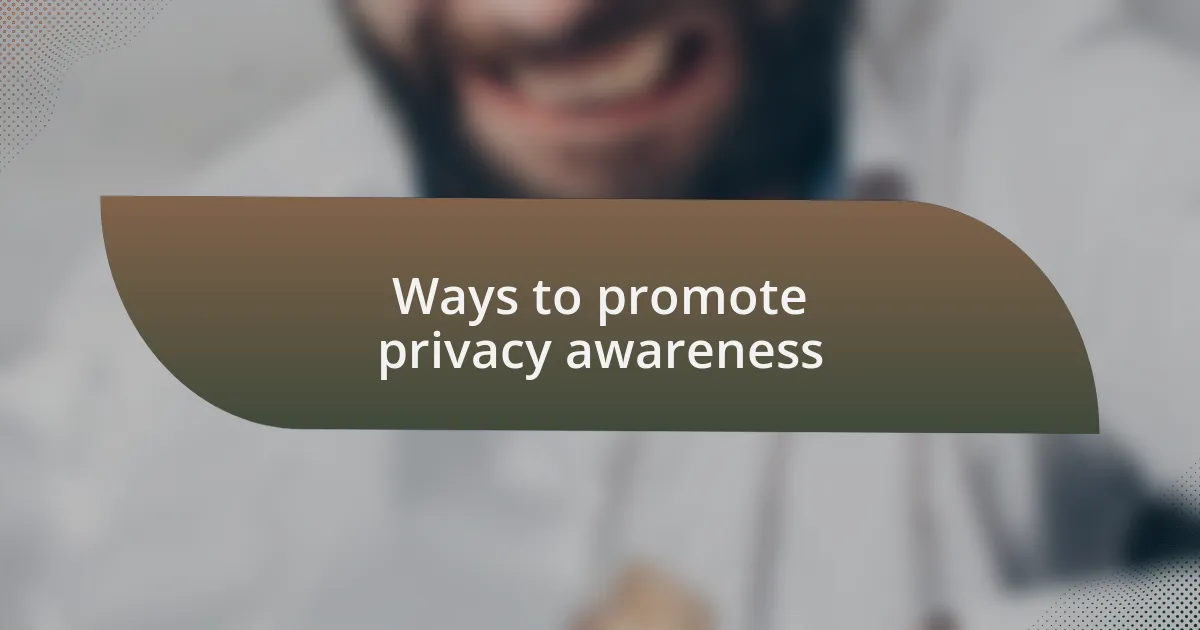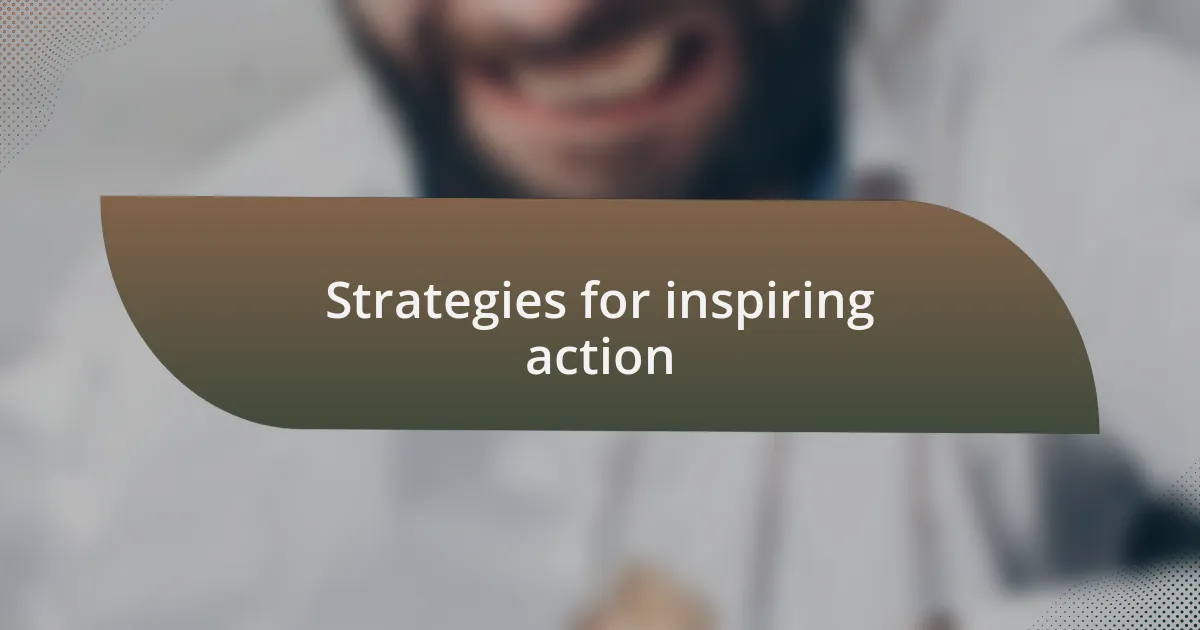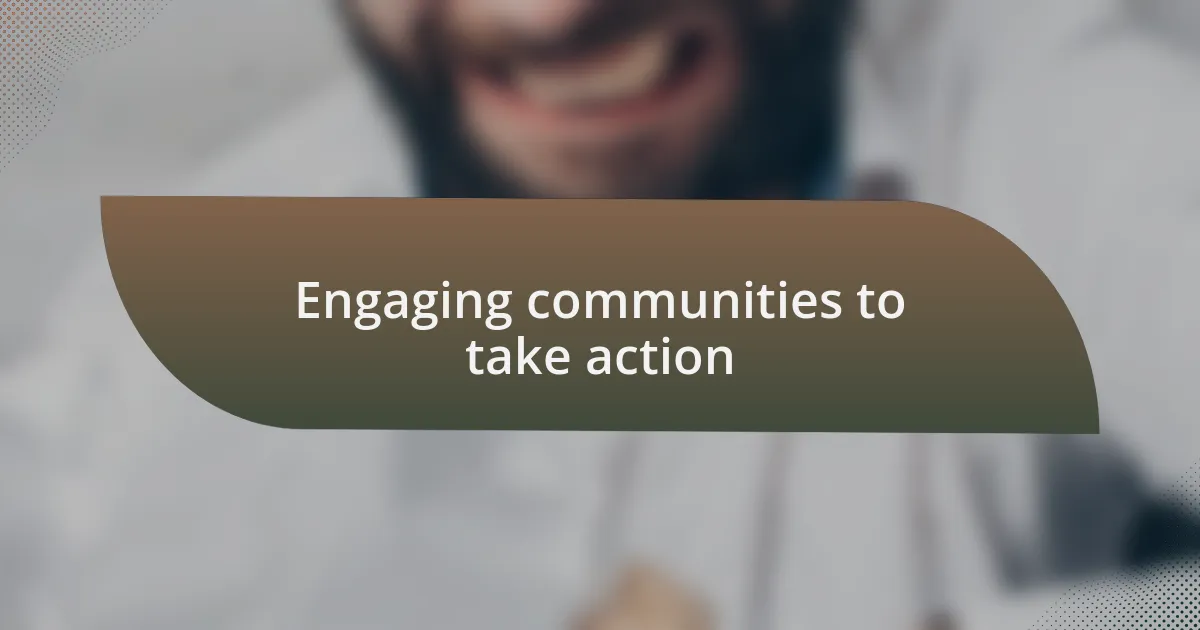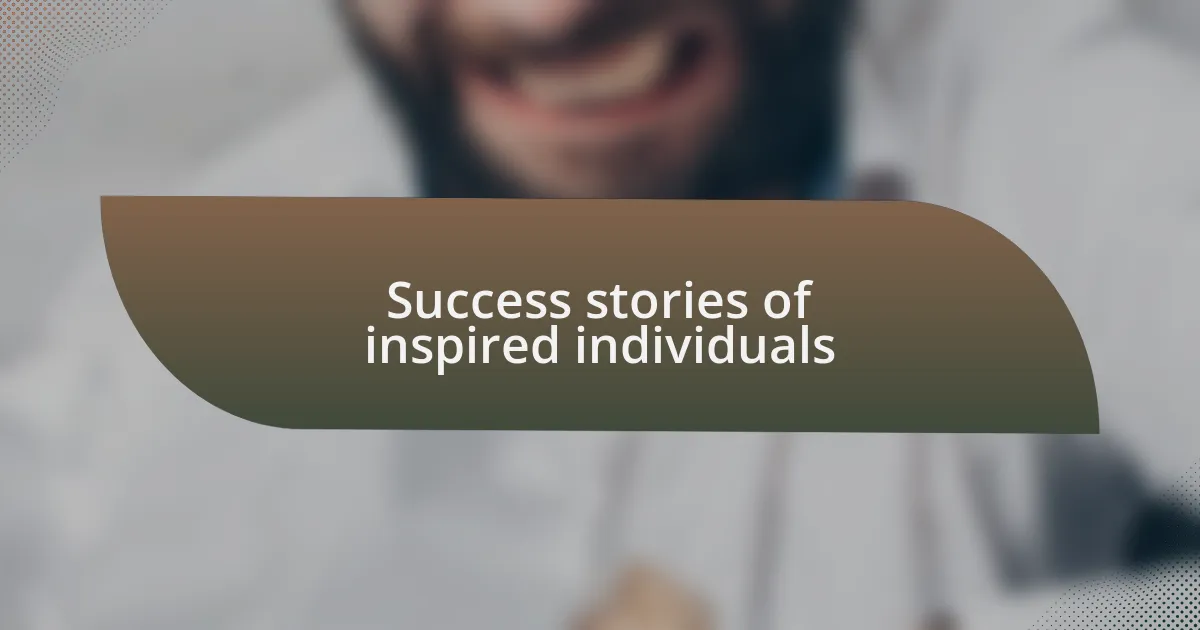Key takeaways:
- Privacy advocacy empowers individuals to understand and protect their personal information in the digital age.
- Sharing personal stories and engaging in discussions can effectively raise awareness about privacy issues.
- Workshops and educational content tailored to specific audiences inspire proactive behavior towards online safety.
- Community engagement through storytelling fosters unity and motivates individuals to take action for privacy rights.

Understanding privacy advocacy
Privacy advocacy is about safeguarding individual rights in an increasingly digital world. I remember when I first stumbled upon a massive data breach that left thousands vulnerable. It sparked a whirlwind of questions in my mind: How could this happen? Isn’t our personal information supposed to be safe? That moment ignited my passion for understanding and advocating for privacy rights.
It’s fascinating how often we overlook our digital footprints. When I talk to friends about their online habits, I find many are blissfully unaware of how much data they share. This realization often leads me to ask, “Do you truly understand who has access to your personal information?” We often don’t realize that our consent to data sharing is not just about a simple click but a significant exchange, and I feel compelled to help others find their agency in this process.
Moreover, privacy advocacy is about empowering individuals to take action against intrusive practices. I’ve seen firsthand how informing someone about their rights can transform their perspective, turning apathy into activism. Isn’t it empowering to know that we can say no to practices that don’t align with our values? That shift in mindset is what fuels the advocacy movement – a commitment to reshaping the digital landscape for everyone.

Ways to promote privacy awareness
One effective way to promote privacy awareness is by sharing personal stories about experiences related to data misuse or breaches. I still vividly recall a friend who fell victim to identity theft, which not only disrupted her life but also her sense of security. When I shared her story at a community meeting, the impact was palpable — people began to see how real the danger was and started discussing their own vulnerabilities.
Engaging in conversations on social media can also amplify privacy issues. I often post articles or infographics that illustrate the importance of protecting personal data, and I always encourage dialogue in the comments. This exposure not only informs my followers but creates a ripple effect, encouraging them to share their thoughts and insights. Have you ever noticed how a single post can spark a passionate discussion among friends? That’s the beauty of using digital platforms to advocate for privacy.
Lastly, workshops or informational sessions can be game-changers in raising awareness. I once organized a small event focused on practical steps to enhance online privacy. Watching participants actively engage, ask questions, and exchange tips was incredibly fulfilling. It highlighted that many people are eager for knowledge — they just need the right environment to foster that enthusiasm. Isn’t it rewarding to facilitate that kind of learning?

Strategies for inspiring action
When I think about inspiring action, I often reflect on the power of relatable analogies. For instance, I once compared online privacy to locking your front door. People seemed to grasp the analogy immediately; just as we wouldn’t leave our homes wide open, we shouldn’t expose our personal information online without precautions. This simple comparison prompted a number of my friends to reevaluate their online security settings, which was an unexpected but gratifying outcome.
I’ve also found that grassroots campaigns can ignite passion and mobilize people. A few months ago, I participated in a local rally advocating for stronger privacy regulations. The energy was infectious as participants shared their stories and motivations for attending. Hearing firsthand accounts from others who felt similarly inspired me, and I noticed attendees leaving motivated to write to their representatives. Have you ever felt that surge of determination just by being in the right crowd? The sense of belonging can truly be a catalyst for action.
Finally, I believe that creating educational content tailored for specific audiences can drive significant change. For example, I’ve collaborated with a few organizations to develop easy-to-understand guides for teenagers about online safety. Seeing their excitement as they learned something new and practical was so rewarding. It reinforced my belief that when people are presented with clear, actionable steps, they are far more likely to take the initiative. After all, who doesn’t want to feel empowered to protect their own digital footprint?

Engaging communities to take action
One approach that truly resonates with communities is to host workshops that allow for open dialogue. I once organized a small gathering where individuals could share their experiences with privacy breaches. Listening to their stories, I realized how personal these encounters felt to everyone involved, which made the discussions much more impactful. It was during these moments of vulnerability that attendees became motivated to learn more and actively seek solutions to safeguard their personal information.
Utilizing social media platforms can also amplify community engagement. I recall a campaign where I invited followers to share their tips for maintaining online privacy in a creative way. The response exceeded my expectations, with people posting everything from clever memes to detailed guides. It was heartwarming to see how sharing personal insights inspired others to take similar actions and raised awareness in an organic, community-driven manner. Have you ever witnessed how a simple prompt can lead to a cascade of helpful information?
Another effective method is the power of storytelling. Once, I addressed a community meeting and shared my own journey of navigating online privacy challenges. As I spoke, I could see nods of recognition around the room. It struck me how relatable our struggles can be; branding these issues as collective rather than individual creates a sense of unity. By creating an emotional connection through storytelling, I’ve seen how people are more likely to engage and, ultimately, feel compelled to make changes in their own lives.

Success stories of inspired individuals
It’s remarkable to witness the transformation that can occur when individuals feel empowered to take action. I remember one instance when a participant from my workshop approached me after the session. She shared how inspired she felt to lead a privacy awareness seminar at her own workplace. The idea that my words could spark such initiative in someone else was incredibly rewarding.
Another success story comes to mind involving a young college student I met through an online forum. After engaging in discussions about data protection, she launched a campaign on campus that encouraged students to adopt secure online habits. The excitement she exuded was contagious, and seeing her brave efforts helped foster a culture of privacy consciousness among her peers. Isn’t it incredible how one person’s determination can create a ripple effect?
Reflecting on these experiences, I often think about the collective potential we possess. There was a time when several individuals who had attended my sessions formed a support group focused on digital rights. Each member brought their stories and unique perspectives, forming a community that now advocates for privacy legislation. It’s a fantastic reminder of how shared knowledge can lead to action, wouldn’t you agree?